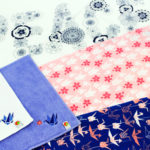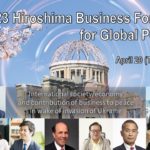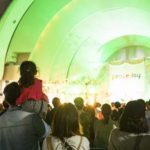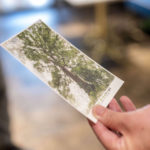My Ideal Vision of Peace Making a better society through medical care and information sharing -Ue Misaki-
Ue Misaki
The building that can be called the symbol of Hiroshima: the Atomic Bomb Dome. It is interesting how every time I see these remains, they evoke different emotions in me.
The first time I saw the Dome was when as a junior high school sophomore visiting Hiroshima for peace studies. Looking at the building that was destroyed by the force of the blast and heat made me realize the simple fact this was a place that had really been struck by an atomic bomb.
The second time was after I had moved to Hiroshima to attend university and explored the city by bicycle to get familiar with the streets. Moving through the city on my own, and reflecting on the fact that the bombing had happened in a city like this, finally knowing exactly what kind of place the Atomic Bomb Dome was standing in was a bit surprising.
The third time was when I was finishing a peace report to hand in for a university class. I went to the Peace Memorial Park to be able to feel more strongly how real war and peace were. Next to the Atomic Bomb Dome I was gazing up at, the river was flowing quietly and the city trams were running leisurely just like every day. I found myself thinking, “It’s so peaceful now, but how much pain and suffering the people must have gone through at that time.” Thinking about the victims of the bomb jumping into the river in search of water made me feel like my heart was breaking.
While living in the city of Hiroshima, part of me may have become synchronized with this land at some point. Remembering the Atomic Bomb Dome and the emotions it evoked in my heart when looking at it, I would like to put down my thoughts about peace in writing.
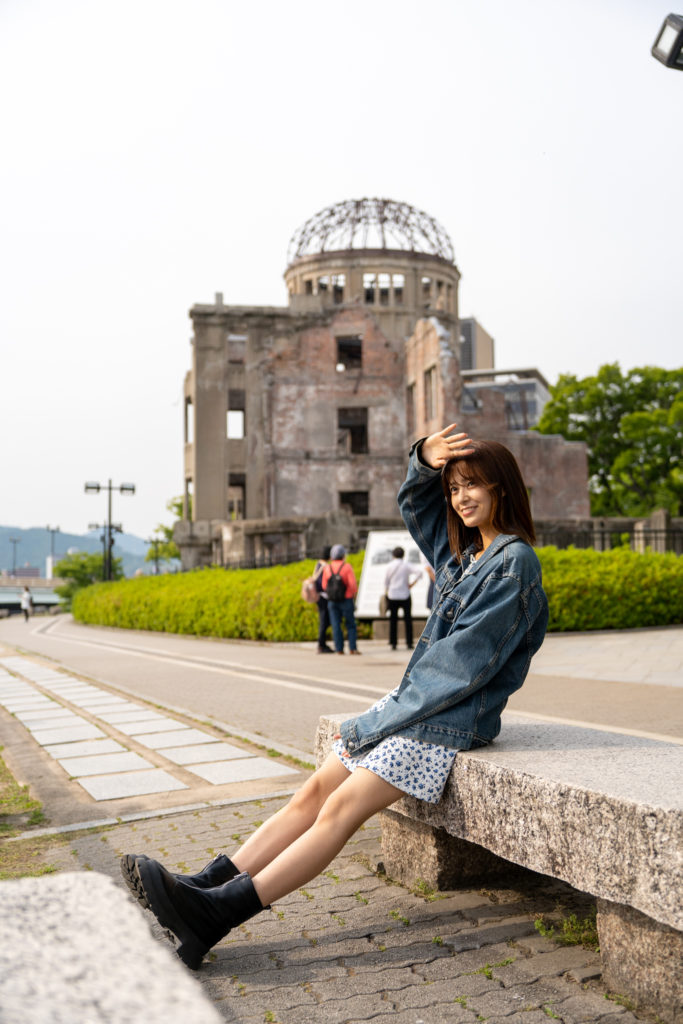
A happy childhood surrounded by loving family
I was born in 1999 as the eldest daughter of the Ue family in Okayama City. My father was an elementary school teacher and my mother a high school teacher and we were a very ordinary family. I also have a brother who is four years younger than me. Since both of my parents were always busy, when I was in elementary school I often went to visit my grandparents’ house, which was a 1-minute walk from my home. My grandfather was a big-hearted and spirited person, always telling me, “Have big dreams. When you grow up, you could think about going abroad.” My gentle grandmother was good at cooking and sewing, and she often made me large rice balls as a snack.
Whenever I scored a good mark on a test or received a prize, they openly complimented me, telling me how talented they thought I was. This motivated me to do my best again so that I could see their happy faces. I think the reason that I am so sure of who I am right now is because of the overflowing love I received from my grandparents.
My father, even though often busy, also planned family camps and barbecues and often took me along on outings. My mother fully supported her children’s dreams, so when I was young, she let me take lots of different lessons to nurture the buds of various talents. I am grateful and feel truly blessed to have grown up in such a wonderful family.
War stories from my great-grandfather
I think the first time I came in touch with the reality of war was when I was in my early elementary school years. We had all gathered at my great-grandfather’s house for the Obon holiday, and the conversation turned to how my great-grandfather came back from Manchuria after narrowly escaping death during the war. Nobody mentioned any specifics, but I remember listening to the adults talking about how glad they were he made it home alive and how they had thought he might not make it, and I vaguely understood that it was only because my great-grandfather had managed to survive that we were all here today.
Later, my great-grandfather showed me certificate of commendation that he had received from the government, saying, “This is the proof that I went to war.” I was surprised to see the name of the then prime minister engraved on it. I had had a vague understanding of war as something scary, but now I came to fully realize how huge a thing it really was. My great-grandfather was sipping his favorite green tea while he talked, and at the time the horror of war was only tangible for me to the extent that I felt glad that my great-grandfather was able to enjoy his favorite tea again.
Peace studies at school
It was during peace studies at school that I began to make the connection between war and the emotion of fear. In Okayama, many elementary and junior high schools include peace education in their general education classes. In addition to learning about the history and hearing directly from victims, anime and manga are also sometimes used as teaching materials to deepen the students’ understanding.
The first anime I saw was either “Barefoot Gen” or “Grave of the Fireflies.” I wasn’t able to watch the film until the end because of the almost grotesque ghastliness and misery that brought home the reality of the events. I remember that a number of other girls in the class were similarly affected. We closed our eyes and waited for the storm of unspeakable anxiety and fear to pass. The boys, who loved cars and airplanes, were talking excitedly about fighter planes, but to me all of that seemed far away.
During junior high school, our class went to visit Hiroshima on a two-day trip as part of our school’s peace education program. We visited the Peace Memorial Park to see the Atomic Bomb Dome, the Atomic Bomb Victims Memorial Cenotaph, and the statue of the child with the folded paper crane. Once again I could feel for myself that this was a place where an atomic bomb had exploded.
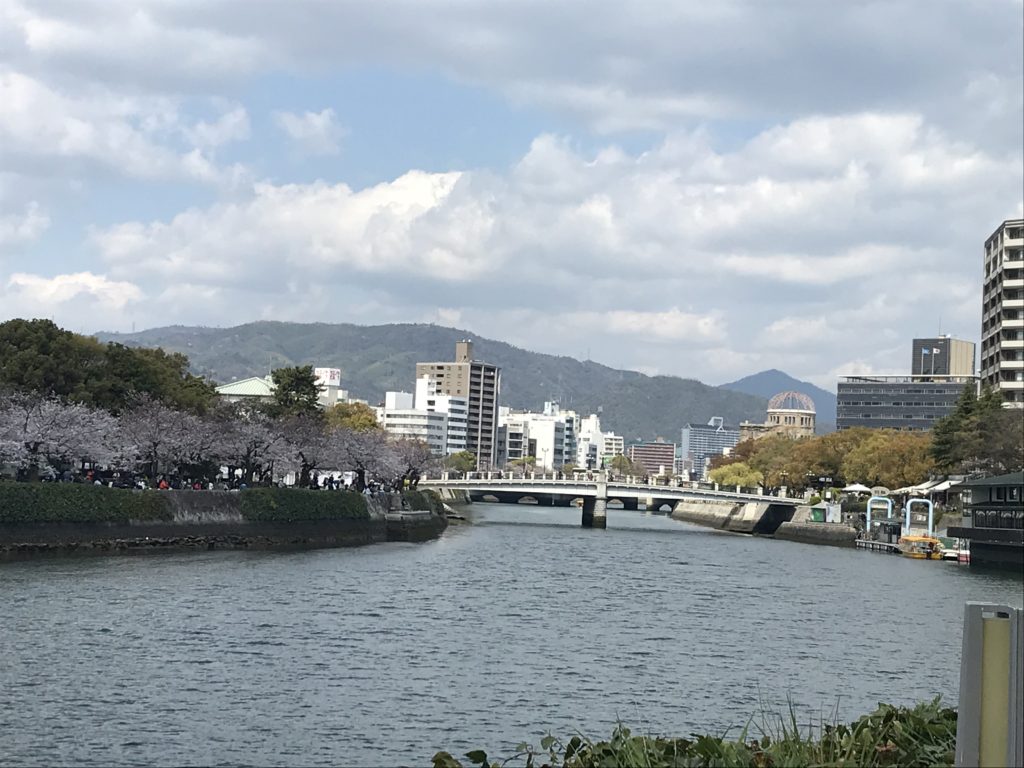
The most devastating experience for me was the Peace Memorial Museum before its renovation. It had an incredibly eerie atmosphere, and the wax figures covered in blood stains were so frightening they made me feel weak in the knees. I thought I might actually faint when my eyes fell on a keloidal piece of a human tongue that had been exposed to radiation. A human tongue? What? My mind couldn’t quite catch up with what I was seeing, but when I realized that this piece of tissue had unmistakably been part of someone exposed to the atomic bomb on that day, I started seeing hellish images in my mind that filled my heart with unspeakable pain and fear.
The next day, we went sightseeing in Miyajima and I joined a group who wanted to have some fun in the city. We headed to the Hondori shopping street where we took a break at a café. By that time, the feelings of sadness and fear simmering in my heart had faded somewhat, and I enjoyed the happiness of spending time with my friends. There was such a huge gap between how I felt at that moment and what I had experienced the day before, but it made me think that perhaps peace was a word describing a simple moment such as this.
Moving to Hiroshima for medical school
Years later, when I was in the winter of my high school sophomore year and the time had come to choose a career path, I decided to go to medical school. The reason behind this decision was the kind, dignified, and very inspiring female pediatrician who lived in my neighborhood and whom I had admired since I was a child.
I also loved animals and plants, especially fish, since I was a child and had the rather unusual hobby of collecting fish otoliths. Whenever I saw Sakana-kun (Mr. Fish) on TV, I would think to myself, “I want to become Sakana-chan (Mrs. Fish)!” and so in a sense my heart had already been set long before I set my eyes on the medical school entrance exam. I think the spirit of pursuing something out of curiosity also applies to practicing medicine, so perhaps this part of my personality also drove my ambition to study medicine.
I chose Hiroshima University largely by chance, mostly because I liked the atmosphere when I visited the university on its open campus day. Other reasons were that I wanted to live on my own and that Hiroshima was not too far away from my parents’ home.
After the peace studies, I visited Hiroshima once when I was a freshman in high school for a concert of my favorite artist. I still vividly remember the fantastic concert at Edion Stadium and the excitement coursing through me all the way home. Although I could count the memories I had made in Hiroshima on one hand, strangely enough, I could still easily imagine myself living in this city.
However, the medical school entrance exam proved to be anything but easy. While still in high school, I took the entrance exam for Tottori University School of Medicine, but I did not pass and had to endure the hardship of being a ronin (a student who has to wait another year until the next entrance examination). I drew up a study regimen of 12 hours a day for myself, but no matter how much I studied, I could not shake off my anxiety and on the day of the center exam, I was so nervous that my hands could not stop shaking.
In the end, I fought my way through to earning the results “Accepted” from Hiroshima University School of Medicine, and besides being overjoyed, this experience taught me the importance of working hard and the strength resulting from overcoming my own weaknesses.
A fulfilling university life and challenging the Miss Contest
And so I started studying at Kasumi Campus in Minami-ku, Hiroshima City, near Hiroshima University School of Medicine. It was the very picture of the university life I dreamed of. I spent the spring of my life studying, participating in club activities, and doing many other fun things. I also remember feeling like a grown-up and getting carried away when I went to an izakaya (Japanese-style bar) with my friends for the first time.
But these happy days did not last long. In the winter of 2020, the COVID-19 pandemic started raging around the globe and soon also engulfed Japan. Lectures, club activities, and events were canceled. Not being able to meet other people, I spent those days feeling slightly depressed. Upon visiting my family at home, my mother said something like this to me: “I think you should just do all the things you can only do while you’re young. In my days, I should have just tried out for a beauty pageant or something.”
“Oh, so even with all the restrictions, there are still things that I can try doing…” Realizing this made me sit down immediately and search the internet for “beauty pageant.” To my surprise, I stumbled upon the application guidelines for “Miss Japan 2021,” with a deadline on exactly that day. Feeling something like fate, I rushed to write up my application documents and sent them in the same day.
After that, I passed the screening step and one thing leading to the next, I suddenly found myself in the final round. I have always been a very active person, and my mindset is that if I’m going to do something, I want to give it my all. So I started streaming videos on TikTok to improve my skills, and practiced walking and speaking a lot.
And finally, in the All Japan competition, I won the runner-up prize. While part of me was in disbelief, another part also wanted to be a bit proud of myself. When I was young, I suffered from terrible dermatitis and was troubled about my bad skin for quite a long time. With this, I could break away from that complex and from here on, my life began to move in big steps.
Awareness as a resident of Hiroshima
Since then I have been busy being a medical student as well as a talent and have also been active on SNS.
My total number of followers on TikTok, YouTube, and Instagram is in the hundreds of thousands, and I get lots of different comments from people of all ages and walks of life. The scope of my work has also greatly expanded, and I have been entrusted with roles in diverse areas, such as town revitalization and raising awareness for cervical cancer vaccinations.
As an official supporter of my favorite soccer team, Sanfrecce Hiroshima, I was involved in the development of merchandise, and currently I am an MC for a local TV program. As I learn more and more about the city and interact with the locals through these activities, I feel that I am gradually becoming more like a person from Hiroshima.
The straightforward and passionate temperament of Hiroshima residents has become very familiar to me. In May 2023, the G7 Summit was held in Hiroshima, and before I knew it, I found myself glued to the TV watching the coverage. The presidents and prime ministers of all these countries were visiting the Peace Memorial Park where I had learned about the horror of war and the preciousness of peace in junior high school. And now these world leaders were with their own hands opening the doors to the Peace Memorial Museum, which has since undergone a renewal and now holds much more power to communicate.
Although the events inside the Peace Memorial Museum were not broadcast, I am sure that all the leaders must have been touched and gained some new understanding from their visit. The historical significance of this moment gave me goose-bumps, and it must have been even more moving for the residents of Hiroshima and for second- and third-generation A-bomb victims.
My Ideal Vision of “Peace”
I have thought a lot about the word “peace.” Does it mean a world where everyone can smile? A world without conflict? The answer I came up with from my personal perspective is “a world where everyone has the opportunity to pursue whatever it is they want to do.” For some people, that is something they take for granted, but for others, such a world is incredibly far away.
I myself have had the privilege of enjoying such a world of peace. Of course, I also put in some effort. I studied excessively for the entrance exams, and I worked hard for the Miss Contest. Being active on social media is also not all fun and games. Some people leave insulting comments, and some people walk away from you. But when I shared my experience with the entrance exams or talked about medical school, I also received comments such as, “You inspired me to study harder,” or “I’m going to pursue medical school” and that makes it worth the effort.
And when it comes to the question, “Are you able to do what you want to do?”, I can answer with a resounding “Yes.” I am happy and blessed to live in an environment where I can pursue whatever I want. Japan is one of the more peaceful countries, where most can live without hunger, strife, poverty, and epidemics.
Perhaps there are many people who cannot share in this happiness, even if they live in the same country as I do. If so, I will support them in any way I can. I hope that there is something even in my simple words that other people can connect with.
Contributing to society through medical care and information sharing
In my university days, I wrote about the connection between peace and medical care in a peace report assignment, I wrote about the connection between medical care and peace. War, which takes away the precious lives of so many people, is in opposition to medicine. Even in wars, there are lives that can be saved through treatment and surgery. However, the lives should not be saved only for those people to then go back to the battlefield or hurt others.
My wish is to provide medical care in a world of peace. I believe that medicine can only display its true value in a world that people feel is worth living in, where they can fulfill their dreams and enjoy trying and doing things they like.
In the future, some of my fellow students at university will become doctors who are experts in their field and some will become instructors devoting themselves to teaching future generations. For myself, I want to find something which only I can do. With my medical knowledge as my basis, I intend to continue sharing information and words of support and encouragement.
Right now, I cannot do much more than post things that are typical of a medical student or share helpful information about studying, but someday I want to deliver truly useful content based on solid medical knowledge to those who need it. I am in the middle of learning the ways of disseminating information and am charging up my energy for the future. If the scope of my activities expands and I find something that I can contribute to society with, I will gladly devote my time and experience to that cause. Because that first step may be a small piece of the puzzle of creating a world that we can call at peace.
The Atomic Bomb Dome has inspired me to reflect about peace at various times in my life. When will I next look at the Atomic Bomb Dome and feel some new emotion welling up inside me? Will it be when I have decided what to do in my life, or maybe when I hold my own child in my arms?
Whenever it may be, I pray that the world will be more peaceful and happier than it is now. And I hope that I myself will have made some small contribution to society as well.
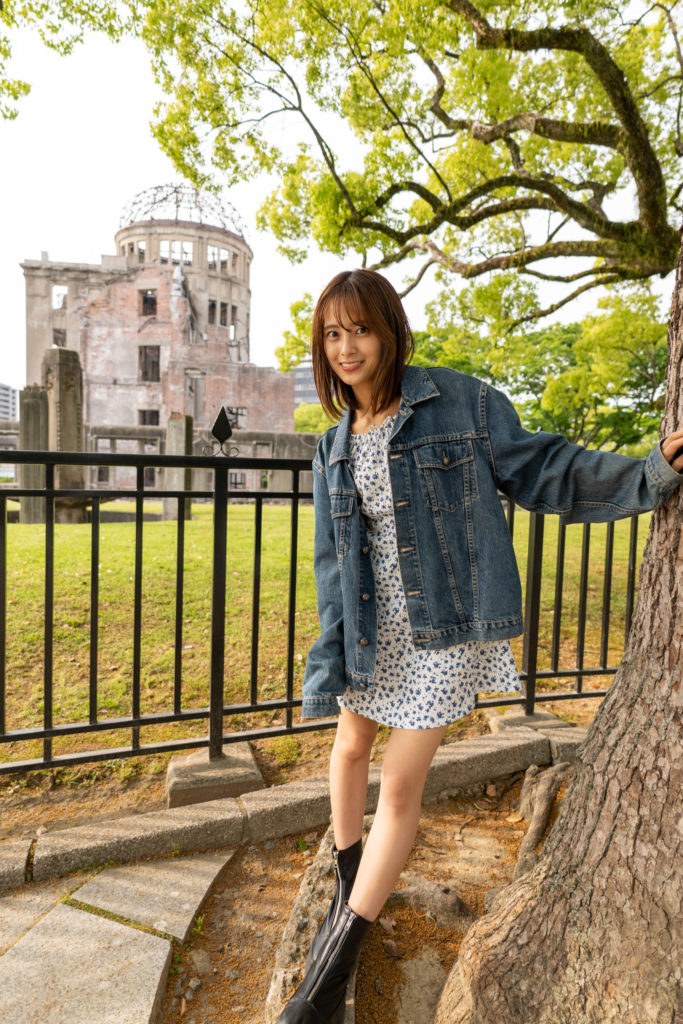
Profile
Ue Misaki
Born in Okayama City, Okayama Prefecture in 1999. Moved to Hiroshima to study at the Department of Medicine at Hiroshima University. Represented Hiroshima Prefecture in the “Miss Japan 2021” contest and won the runner-up prize. Her hobbies include making videos and cooking. She posts information on SNS such as TikTok and YouTube, choosing topics and analyzing access data by herself. She is the MC for Hiroshima Home Television’s “Reach! Hiroshima Supporters’ Song” and continues expanding her activities.
\ Follow me /
\ Join us/
Tags associated with this article



![[Interview] The Importance of Information in Peace and the Role of Information Companies [Interview] The Importance of Information in Peace and the Role of Information Companies](https://hiroshimaforpeace.com/en/wp-content/uploads/sites/2/2023/09/瀬尾様_プロフ.00-1-150x150.png)
